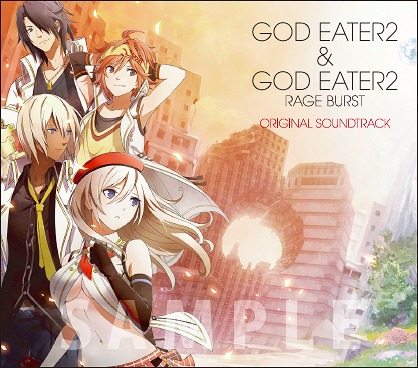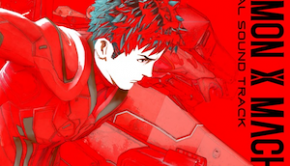God Eater 2: Rage Burst Original Soundtrack
 |
Album Title: God Eater 2: Rage Burst Original Soundtrack |
| Record Label: Avex Trax |
|
| Catalog No.: AVCD-93125 |
|
| Release Date: February 25, 2015 |
|
| Purchase: Buy at CDJapan |
Overview
Last November, Masaru “Go” Shiina left Bandai Namco after a twenty-year career with the company. Following early contributions to games like Ace Combat 3 and Klonoa 2, Shiina’s VGM fame grew with 2005’s Tales of Legendia, the first soundtrack for which he was chiefly responsible. After Legendia, Shiina returned to working as an ensemble player, composing stage tracks for Tekken and IDOLM@STER. But in 2010, Shiina was given God Eater and the chance to fully express his mature and multifaceted style. It’s fitting, then, that his last major project for Bandai Namco, and his most ambitious to date, is 2015’s God Eater 2: Rage Burst, a soundtrack that finds Shiina at his most mercurial. At 83 tracks, Rage Burst maps a musical sensibility as baroque and baffling as the story it accompanies.
Body
God Eater is the tale of a teenage paramilitary battling creatures called aragami — literally violent gods — the kind of unreasonable and remorseless villains on which video games depend. In the world of God Eater, it’s kill or be killed, or rather eat or be eaten. You see, Earth’s champions combat the aragami using God Arcs, bioweapons derived from the aragami themselves, weapons that eat the semi-sentient cells of which aragami are composed. God eater — get it? How you react to a premise like this probably depends on the number of video games you play in a given year.
Still, a game in which gods menace anime avatars should have apocalyptic music, and Shiina dutifully brings the Götterdämmerung. His soundtrack is dominated by operatic compositions like “Harsh Enlightenment” and “Divine Punishment Upon Us,” tracks as rich and layered as their melodramatic titles suggest. Elegiac strings and mournful organ convey the gravity of war and the uncertainty of its outcome, while triumphal horn flourishes and the crash of cymbals stir players to action. Choirs, too, put the god in God Eater, sometimes literally as in “Kami to Hito to (End of My Dream).” The throng of many urgent voices (e.g., “Sleeping in the Depths”) gives Rage Burst something of sacred music’s somberness even as pop profanes the proceedings.
Shiina enjoys melding musical traditions, and he plays against the listener’s expectations whenever possible. “Puppet of Justice,” for example, compresses a symphony into the space of three minutes, moving from soothing synth loops to a busy middle passage of strings, horns, and vocal chants, arriving finally at a climax of rock-opera percussion. “A Black Flash” combines traditional Japanese music — dig the shamisen based percussion — with a cinematic horn section. Elsewhere, acoustic instruments careen into the wobble bass of dubstep, demonstrating the acoustic-synthetic duality that emerged early in Shiina’s career. Nowhere is this contrast more apparent than two songs that sit awkwardly alongside each other. On “Tragedy” an unaccompanied choir sings a mournful hymn to heaven, but hardly has the reverb faded before “Koimeka” hits the dance floor. With its distorted bass and vocaloid singing, it wouldn’t sound out of place at a Hatsune Miku concert.
Shiina once told an interviewer, “I can write in any genre, as long as I’m motivated,” and Rage Burst is proof of that boast. Though the album’s mood is overwhelmingly one of an opera at the end of the world, Shiina occasionally breaks tension with a genre exercise. “Lovely Bubbly” is laptop pop, straightforward and synthesized from start to finish. “An Extravagant Moment” is a flute-heavy slice of exotica that leans into self-parody with its doo-wah scat singing. And “Country Cowgirl,” with its banjo and harmonica, is the kind of track that makes you want to play God Eater just to learn how and where it fits in with all the slaying (full disclosure: I did not play the game before reviewing its soundtrack).
The downside of this versatility is that you inevitably wind up with some tracks that are weaker than others, and a soundtrack this long is already an argument for editing. The vocal tracks are especially weak in this respect. Some, like “Hikari no Aria,” are delicate and pretty. Others, like the boom-bap of “Back Down” or the unmitigated schmaltz of “Tree of Life” will prove more divisive among listeners.
Summary
The larger problem with Rage Burst is that Shiina too often tries for maximum effect — the biggest emotion, the most grandiose arrangements. Given a full orchestra, he seems determined to use every sound it can conjure, resulting in an album where virtually every track is climatic. When each song pricks tears or plucks heartstrings, fatigue sets in quickly, and everything that isn’t a 30-second hootenanny begins to blur together. God Eater 2 would benefit from moments of calm, studies of the introspective intervals between battle, compositions that might provide a rest for listeners’ ears and restore some of the feeling to the biggest tracks by means of contrast.
Yet there is no denying the excitement that Shiina’s anthemic tracks generate. God Eater 2 may be frustratingly incoherent at times, but there’s no denying Shiina’s adventurousness nor the range of styles in which he can work. Shiina may have outgrown Bandai Namco, but video games still need his audaciousness.
Do you agree with the review and score? Let us know in the comments below!
3
Posted on February 19, 2018 by Michael Hughes. Last modified on February 21, 2018.















I’ve been following VGMO since the previous site that is Square Enix Music Online and I have to say that this God Eater 2 & God Eater 2 Rage Burst Original Soundtrack review is the most half-arsed essay that has been ever written out of this or the previous iteration of this site since ever.
The review for the soundtrack make absolutely no mention of the soundtrack’s strong points and instead opt to bombard the album with the few weak points that the album has and amplified them like they are plagues that ruined the album. Said weak points are not even taking up to 1/10th of the whole album, and yet all the review’s selected songs choose only those weak points to try to make their “point.”
Also, the “point” that the reviewer is making, that the album is not cohesive, is moot. The majority of the album uses orchestra, yes, but it does make use of techno & hip-hop to enhance the listening experience & variety of the soundtrack, which, when combine together & spread them throughout the album, DOES make the album cohesive. Almost all of the tracks that the reviewer here fail to mention make use of mixing both of the elements, and yet the reviewer would pick apart and treat the album as a whole as not cohesive because the reviewer simply can’t stand how “grandiose” the tracks are.
Not to mention, this reviewer would quote the artist’s interview and make said quote be taken out of context in a negative light. Artist interviews should absolutely not be used as merits for reviewing the quality and content of the albums he or she has made. And yet, this reviewer just chose to do so, causing the review to be reek of bias of the reviewer disliking the artist.
Lastly, the reviewer has chosen to not play the game before making this review of the soundtrack. If this site actually going to be a video game music review, they NEED to ensure that they should know what to expect out of the game before actually reviewing the album itself. The base game, God Eater 2, has been out for 5 years on PSP & PS Vita, even though it’s Japanese only at that time. Five years is a lot of time for the reviewer to give the game a try before making judgement of the album.
And if the reviewer would continue to dismiss such soundtrack that is actually feel varied & energetic such as this, then clearly the soundtrack is not for the reviewer, and another review should be issued to let visitors of the site see this soundtrack from another perspective, not just from the disliker.
But if this site is going to keep such half-arsed review that only bash weak points, ignore strong points, and involve artists’ interviews and comments that shouldn’t be relevant to their music making processes, then might as well call this site a fraud, with “reviewers” not doing their game research enough & just making clickbait reviews such as this.
Our writers are all volunteers, and as hard-working as they are, I can assure you that none of them have spent five years working on any single review (I would be concerned if they had). Additionally, given our various day jobs, nobody on our website has the ability to play through every game they review – that has never been the case, even in the SEMO days.
It sounds like you have a lot of opinions on the soundtrack. Given your knowledge of the score, and the fact that you have been able to reflect on it for a good amount of time, we’d love to have a second look review from you. Feel free to send me an email at emily@vgmonline.net if you have a write-up you’d like to share.
I would, however, ask that you focus on the soundtrack rather than the author (reviewer) in your comments. While you may not agree with everything we post – and while we love and invite discussion of soundtracks – I ask for basic respect when you engage with our writers.
As a writer for SEMO and VGMO over the last eight years, I feel compelled to add my two cents (and I’m only speaking for myself here, not for VGMO as a whole or anything).
I think there might a misconception here about what a review is and does. You feel that the way the album combines genres creates cohesiveness – the reviewer did not. Both of you are perfectly entitled to your opinion and I don’t believe there is one ‘correct’ answer to whether the album is cohesive or not – that will be larger in the ear of the beholder and views will differ from listener to listener. Similarly, I would personally disagree with your statement that the soundtrack is ‘actually’ varied and energetic. There’s no need for an ‘actually’ here, as if it’s a fact that the album is varied and energetic. Again, opinions on that point will differ and there’s no right or wrong. The case is simply that you feel differently to the reviewer about the merits of the score.
That’s the nature of reviews of any piece of art, be it music, film, book etc. – there is not one definitive, ‘right’ view of the value of a piece of art. That is not to say that art and music criticism don’t concern themselves with objective measure of quality (if an album was recorded poorly or the performers have poor intonation, that’s a quantifiable fact). But a large part of reviewing an album is expressing a subjective view. That’s what reviews ultimately are – one person’s opinion
Our job is to make sure that these opinions are well-researched, -considered and -articulated. And yes, research on the game that the soundtrack is written for is important – but as Emily points out, not everybody has the time to play every game they’re going to review the soundtrack for. Also, please keep in mind that these soundtracks are usually sold as stand-alone items, divorced from the game, with a price tag attached – so they better work that way, without prior knowledge of the game required for enjoyment. In that sense, I believe we are doing our job as a game music review website.
Please don’t get me wrong – this is not an attempt to shut down conversation. We need more debate about game music, different points of view speaking to each other and discussing what make game music great and what doesn’t. However, that debate needs to be respectful and with an understanding that there won’t be winners or losers – and that there’s no need to call reviews that you don’t agree with ‘half-arsed’ and accuse the site of producing clickbait. Keep telling us why you enjoy God Eater 2 (and take up Emily’s offer to write a review of your own if you’re interested), but please do it respectfully.